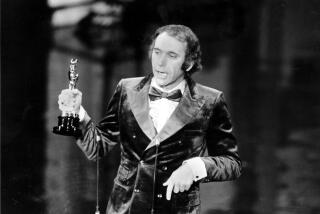Choosing a Dream
- Share via
Mario Puzo, the bestselling author of “The Godfather” (1969), the co-writer of two Academy Award-winning screenplays based on the book, and seven other novels, died on July 2 of natural causes in his Bayshore, Long Island, home. He was 78, and had just completed work on “Omerta,” the last volume in what he considered his Mafia trilogy about morality and power in America. The novel will be published by Random House in July 2000.
Born in 1920 in New York City, Puzo was the son of illiterate Italian immigrants. Following military service in Germany during World War II, he attended City College on the G.I. Bill and began a career writing pulp stories for Male and other now-defunct men’s magazines. Harboring greater literary ambitions, Puzo published his first novel, “The Dark Arena,” in 1955 to considerable critical acclaim. Maxwell Geismar, writing in the Saturday Review, read it “with the sense of discovery and pleasure that a new talent evokes.”
It took Puzo nine years to write his second book, “The Fortunate Pilgrim” (1964), an autobiographical family novel about the Italian immigrant experience. It was hailed as “a small classic” in The New York Times Book Review. Failing to reach a large readership, however, Puzo, supporting a wife and five children, accepted a $5,000 advance from Putnam in order to write a deliberately commercial novel. That book became “The Godfather,” which was an immediate bestseller and would go on to sell more than 21 million copies worldwide. Working with director Francis Ford Coppola, Puzo also wrote the screenplays to “The Godfather” and its two sequels.
A joyful gambler, tennis player and sports fan, Puzo lived what he called a “bourgeois life,” with homes in Los Angeles and Long Island, marked by frequent trips to Las Vegas. His fascination with life inside the world of high-stakes casinos informed his bestselling “Fool’s Diet” (1978). Six years later, he published “The Sicilian,” also a bestseller.
In Hollywood, he was equally successful as the co-writer of screenplays for such diverse movies as “Earthquake,” “Superman I” and “Superman II,” “The Cotton Club” and “Christopher Columbus.” But for all his dabbling in movies, he always regarded himself primarily as an author and wrote all of his books on a 1947 manual typewriter. After “The Fourth K” (1992), a futuristic political thriller about the enduring power of the Kennedy myth, Puzo returned to the Mafia in “The Last Don” (1996), which was greeted warmly by literary critics and fans alike, spending two months on the New York Times bestseller list and becoming the basis of the most highly rated TV miniseries of 1997.
Nearly 30 years ago, Puzo wrote an account of growing up in New York City’s Hell’s Kitchen for McCall’s magazine. Reprinted in “The Immigrant Experience,” an anthology edited by Thomas C. Wheeler, Puzo’s essay is a kind of credo. To mark Puzo’s passing, Book Review publishes it with the kind permission of Doubleday, a division of Random House.
More to Read
Sign up for our Book Club newsletter
Get the latest news, events and more from the Los Angeles Times Book Club, and help us get L.A. reading and talking.
You may occasionally receive promotional content from the Los Angeles Times.







